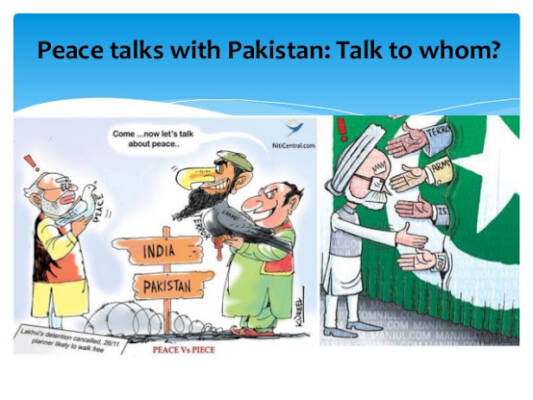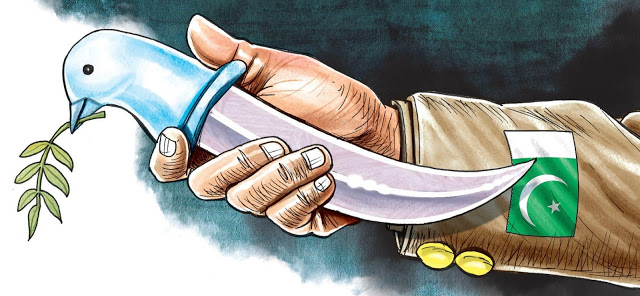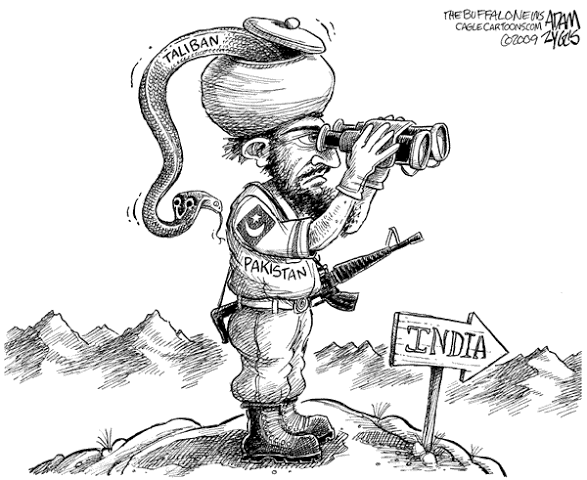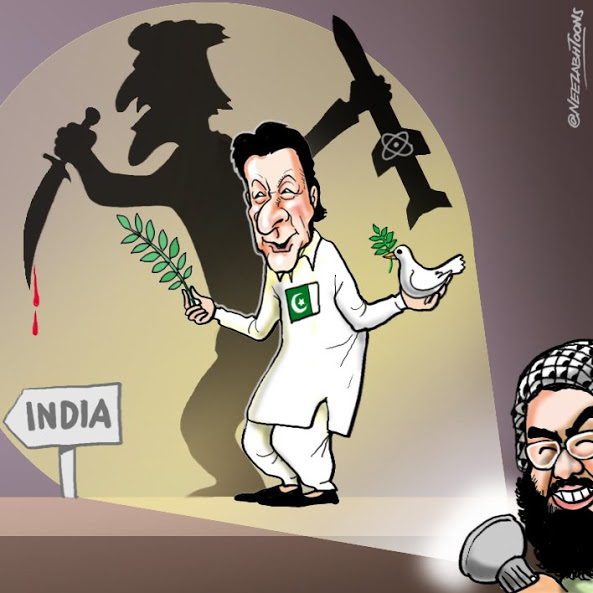Like earlier articles of this genre, this is also a collection of excerpts from articles and opinions of Pakistanis. You may like to go to the link provided to get an idea about the whole article.
EARLIER ARTICLES
STATE OF PAKISTAN
PAKISTAN INTERNALISING
PAKISTANS SOCIETAL FRACTURE
PAKISTANI INSIGHTS
NAYA PAKISTAN NAYA ANARCHY
A DAY IN THE LIFE OF AN ORDINARY PAKISTANI
THE NEW FORMULA
DAWN IN THE DUSK OF PAKISTAN
LOOTERS OF THE FIFTH REICH
PAKISTAN AT THE DAWN OF 2021
THE SICKMAN OF South Asia
CLUELESS AND CHAOTIC
THE LOOMING CATASTROPHE IN PAKISTAN

Déjà Vu @ https://www.dawn.com/news/1614688/deja-vu
Comment. Ashraf Jahangir Qazi has a bleak view of the prospects ahead. Of course his view is coloured by his typical Anti India rhetoric. Sceptical pessimism.
BEEN there! Done that! Or are we breaking new ground in India-Pakistan relations? Pessimism is never constructive. But with India-Pakistan relations, especially the Kashmir dispute, both history and the current situation warrant a healthy scepticism….
The major powers may be willing to help on Kashmir, but only up to a point. They have made clear they will not compel Modi to reverse his Aug 5, 2019, decision despite their robust criticism of his human rights policies. This is supposed to be a sine qua non for Pakistan. Under Biden, the US intends to upgrade its military and strategic cooperation with India against China. It acknowledges India-held Kashmir is now a Union Territory of India. With friends like these who needs enemies? The US cannot facilitate peace between India and Pakistan.
So why will India reciprocate Pakistan’s initiatives? Modi is under no pressure to do so. Nor is he inclined to risk RSS, BJP, Sangh Parivar, and general Hindu outrage to reach a Kashmir deal with Pakistan. He will not even consider one based on understandings reached in the backchannel discussions of the early 2000s. That would require scrapping his Aug 5, 2019, decision. So even if India-Pakistan negotiations are restored they will go nowhere on Kashmir and will sooner or later collapse in the usual mutual acrimony and hostility, unless Pakistan has decided on surrender.
The Kashmiris yearn for relief from “the terrors of the earth” that India has visited upon them. They also have a non-negotiable commitment to azadi, however interpreted. Unfortunately, there is real scepticism about Pakistan’s capacity and commitment to run risks and accept the costs of staying the course in support of the Kashmiri freedom struggle beyond mere diplomacy and law-fare. This scepticism has been exacerbated by talk of a new era in India-Pakistan relations without any concession from India while the Kashmiris of the Valley face the prospect of genocide.
a ‘geo-economic’ initiative towards a hegemonic and intransigent India can only indicate a lack of options. It will never elicit Indian concessions on Kashmir. Accepting this will have consequences in IHK, AJK and at home. It could also impact on China’s perception of Pakistan’s ability to be true to its own national interest.
A Fresh Start @ https://www.dawn.com/news/1614489/a-fresh-start
Comment. The editorial in Dawn shows Cautious Hope.
The need right now is to move forward with guarded optimism as hawks on both sides — who thrive on confrontation — may well try and derail matters. This has been witnessed several times in the past; both countries were tantalisingly close to making peace, only for the process to be abandoned due to spoilers. This time things should be different. The next opportunity for a high-level exchange will come in Tajikistan’s capital Dushanbe, where both states’ foreign ministers are due to attend the Heart of Asia meeting later this month. That meeting may point the way forward for the peace process. As a former Pakistani foreign minister and an Indian expert have written in this paper, if there is seriousness of purpose, everything standing in the way of peace — including Kashmir — can be resolved. This latest opportunity for peace must not be lost.

India May Not Join Anti-Terror Military Exercise In Pakistan @ https://www.dawn.com/news/1614659/india-may-not-join-anti-terror-military-exercise-in-pakistan
Comment. Pakistan hosting an anti-terror exercise! Is it going to be a live two sided exercise? The directors and controllers of this exercise will be Hafiz Sayeed and Azhar Masood. No wonder Pakistan will not invite India! we might knock off their national assets!
Pakistan will host the anti-terror military exercise of the Shanghai Cooperation Organisation (SCO) later this year, but no decision has been made to invite Indian troops, a top military official told Dawn after the Pakistan Day parade on Thursday…. “Pakistan has not yet made any decision to invite Indian troops to take part in the military exercise,” he said. The exercise “Pabbi-Antiterror-2021” is likely to be held in September-October this year at the NCTC in Pabbi, Nowshera district of Khyber Pakhtunkhwa…… He said the Indian media had been running stories that Indian forces would travel to Pakistan for any military exercise for the first time, “but it was far from truth at least for now”.

The Two-Nation Reality vs Theory @ https://www.dawn.com/news/1614173/the-two-nation-reality-versus-theory
Comment. Very interesting article. If there are such notions in Pakistan, we must consider very seriously whether peace with Pakistan is worth it at all? Some major distortions of history guided by an overzealousness of Islamic supremacy…
On March 26 and December 16, 1971, East Pakistan rejected the state structure of the original edifice of Pakistan. However, by becoming Bangladesh, the people of what once used to be East Bengal reaffirmed with passion their abiding belief in the Two-Nation Reality; that Muslims and Hindus are two distinct, separate nations. Neither in 1971 nor today in 2021 does Bangladesh want to reunite itself with Hindu West Bengal. Nor does it want to be absorbed into India. The pride the people of Bangladesh feel about being Muslims is fully evident in Article 2A of their Constitution. While aptly recognising the equal respect owed to other religions, Article 2A begins with the categorical statement: “The state religion of the Republic is Islam …”
The evolution of the Two-Nation Reality has been taking place in two major dimensions and phases. The first dimension is territorial and pre-Muslim. It began about 7,000 years ago with Mehergarh in Balochistan preceding Moenjodaro in Sindh by about 2,000 years as part of the Indus Valley civilisation, which gave way to the ascent of Buddhism as seen in Taxila and Swat. Except for about 700 years (Mauryan BC — Turko-Mughal-British ) the areas that now constitute Pakistan were autonomous, locally-ruled or mostly dominated by forces from West and Central Asia.
The second phase commenced about 1,300 years ago. It added a new religious Muslim dimension to the territorial, ancestral, cultural heritages already there, later blending with mass migration from the east of the Indus post-1947. The advent came with the first Muslims moving into South Asia in the 7th and 8th centuries, be they newly-converted Arab Muslim traders setting foot on the Kerala coast of south-west Asia or, a few decades later, Muhammad Bin Qasim’s invasion of Sindh. As early as the 11th century, the sharp contrasts between Muslims and Hindus in the region were noted by the formidable Persian scholar-traveller, Abu Rayhan Al Biruni, who visited South Asia in 1017 and then wrote a classical treatise. Numerosity grew through migration from Central and West Asia, permanent settlements, peaceful conversions of indigenous people by Sufi saints, transient conquests, long-term control, and minority Muslim rule over a Hindu majority. With the end of the Mughal dynasty in 1857, there began a new critical phase of about 90 years.

There is Hope For Pakistan-India Peace Process @ https://www.dawn.com/news/1614187/there-is-hope-for-pakistan-india-peace-process
Comment. A joint article by Khurshid Kasuri and Radha Kumar. Exudes hope with a dose of reality.
There are already signs of a further thaw in Pakistan-India relations. The two governments have agreed to cooperate on healthcare under the aegis of the South Asian Association for Regional Cooperation, and there is talk of Pakistani cricketers playing in India later this year, just as there are talks of reviving negotiations on religious pilgrimages…. While these may be small steps, it is difficult to imagine what else but small steps could be taken. Public and political hostility towards Pakistan in India and towards India in Pakistan is exponentially greater than it was five years ago. It will take time and perseverance to overcome. As past experience shows, even sustained initiatives by Pakistani and Indian leaders have foundered on relatively lower levels of hostility, because openly-expressed distrust kept the field open for spoilers to step in… Pakistan and India have opened a small window of opportunity. Both governments will need considerable encouragement, from their domestic audience as well as their international partners, to widen that window.
The Way Ahead @ https://tribune.com.pk/story/2291029/the-way-ahead-
Comment. Lt Gen Talat Masood is pretty hard headed and realistic about Pakistan’s internal situation. The General is Hoping For the best.
For most of its life, Pakistan has faced a monumental challenge of defending itself from the aggressive designs of India. Spillover from the civil war in Afghanistan and interplay of major world powers in the region has adversely impacted our national economy and political stability. The provinces of Khyber-Pakhtunkhwa and Balochistan have been the worst hit.
External threats and internal weaknesses led successive military and civilian governments to devote a significant portion of the budget to defense and debt repayment. This left very little for development, and consequently Pakistan has been lagging behind in most economic and social indicators even by South Asian standards.
It is, however, encouraging that there is a general consensus in the top civil and military leadership that Pakistan’s best defence is as much the prosperity of its people as the integrity of its borders. This demands a sustained, integrated and comprehensive approach toward security spanning decades….. The recent signs of thaw in India-Pakistan relations augur well for both countries and the region as a whole, provided it is sustained and covers a broader canvas of cooperation… The region would ultimately benefit if a positive change in relations between India and Pakistan does materialise. There are myriad cross-border issues related to security, the economy and climate change that can best be addressed if the relations move toward normalisation. We have talked of Pakistan being on the crossroads connecting Russia and Central Asia, the Middle East and South and South East Asia. But so far, we have failed to realise and sustain that vision due to the chaotic conditions in Afghanistan and inimical relations with India.

Strategic Shift in Pakistan’s Foreign Policy @ https://tribune.com.pk/story/2290689/strategic-shift-in-pakistans-foreign-policy
Comment. A balanced article from a Pakistani view point. Realistic and hopeful.
But at the Islamabad Security Dialogue, the keynote speeches by PM Imran and Army Chief General Qamar Javed Bajwa clearly showed that there now seems to be a greater realisation that without economic prowess Pakistan will not achieve its foreign policy goals. It was because of this shift in approach that both the PM and the Army Chief sounded conciliatory towards India. The Army Chief’s statement was significant where he stated that it was “time to bury the past and move forward”. The PM said that India would have to take the first step to create a conducive environment for the resumption of talks. What is significant is that Pakistan appears to be no more asking the reversal of Article 370 or at least linking it with the resumption of talks. The conducive environment means that India needs to lift restrictions on occupied Kashmir, and release political prisoners, etc.
There is also a change in tone and tenor of Indian officials towards Pakistan. India has its own strategic reasons to change its approach. Over a year-long border standoff with China has made New Delhi realise that the two-front situation is not tenable. Nevertheless, the shift in Pakistan’s approach focusing on the economy is necessitated by harsh realities. We must ask ourselves: are we making peace overtures today from a position of strength, compared to, let’s say, similar passages of the peace process in 1998, 2004 and even at the start of the first term of the Modi government?
Overall Comment. The olive branch from Pakistan is very thorny. The track record of earlier attempts at peace has not been great. There are too many variables in Pakistan to generate any kind of optimism. With the kind of Indo Pak baggage, the chances of failure are high. However, we still have to deal with them. We need to know how they think. This is an attempt to do just that – get an idea as to how green the grass is in the other side of the fence and nothing more.
-The writer was India’s DG Artillery. He is highly decorated and qualified with vast operational experience. He contributed significantly to the modernisation and indigenisation of Artillery. He is now a Professor in the Aerospace Department of IIT Madras and is involved in applied research for defence technology. The views expressed are personal and do not necessarily reflect the views of Raksha Anirveda








